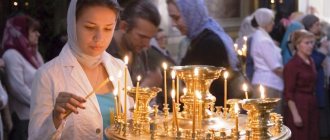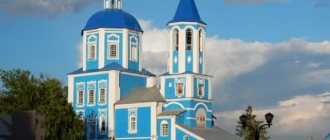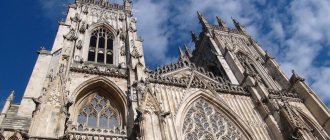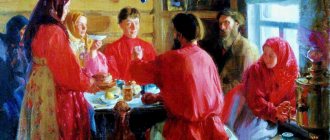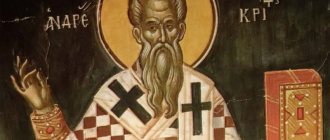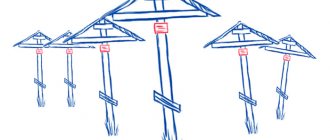Canonical foundations of the structure and life of the parish.
● Formation of parishes ● In the first two centuries of Christian history there were no parishes in the modern sense of the word. All services were performed in the city church by the bishop, co-served by presbyters, deacons and clergy. ● With the growth in the number of Christians in the middle of the 3rd century, in the largest cities of the empire (Rome, Alexandria, Antioch, etc.), in addition to the main cathedral church, other churches were established (with the appointment of presbyters and other clergy to them). ● In the 4th century, Christian churches appeared everywhere in rural areas. The community of believers praying in one church constituted a parish (“parikia”). ● The widespread existence of such parishes is evidenced by the 17th rule of the Council of Chalcedon:
● The ministry of a parish elder extends to one parish community. Pastoral powers are permanent; conferred through the sacrament of ordination (by the bishop). ● Absolute ordination is prohibited by the 6th canon of the Council of Chalcedon. ● Within the boundaries of the parish, the parish priest has full pastoral spiritual authority. Without his knowledge, no outside priest has the right to perform church services in his parish church. The spiritual authority of the parish priest extends to all Orthodox Christians who are permanent members of the church community, as well as those temporarily residing in the territory of the parish. ● The establishment of parish boundaries is carried out in accordance with the administrative division or the 30-year limitation period for the existence of boundaries (38 rights. Trul. Sob.). ● To establish a parish, a sufficient number of parishioners is required so that they can support the temple and the parish priest. ● The right to close a parish belongs exclusively to the authority that founded it.
● Ordination of a parish priest ● The deciding vote in the appointment of a parish priest belongs to the bishop. ● Over time, the participation of the people in the election of clergy, incl. and parish priests, began to lose its former importance. The voice of the laity passed first to the “first citizens” of the parish, and then, in the 11th century, to representatives of state power. In the 12th century, in the Church of Constantinople, the people were practically excluded from any participation in the election of proteges to church degrees. ● Excluding the people from participating in the election of shepherds was not a violation of fundamental canonical norms. For even at that time, when this participation was the most active, it still did not have decisive significance and was only evidence of the dignity of the candidate for the priesthood and the trust in him on the part of the flock. The deciding vote in electing a protege always belonged to the bishop.
● Responsibilities of parish clergy ● The presbyter has no right to leave the parish to which he is assigned without permission ● To move to another diocese, you must receive a letter of release from your previous bishop.
● The pastor is obliged: 1) to live permanently in his community; does not have the right to leave it, especially if an “epidemic disease” or some other danger threatening the people breaks out in the parish; 2) constantly preach in church; 3) ensure that none of the parishioners use things intended for worship for household needs; 4) protect old liturgical items from abuse; 5) ensure that no one introduces anything new or inappropriate into the church in singing, reading and rituals; 6) baptize, confess, marry, bury in your parish; 7) serve Matins and Vespers daily. On Sundays and holidays, as well as during Lent on Wednesdays and Fridays, serve the Divine Liturgy.
● The cleric is obliged to: 1) strictly monitor his behavior in society, at home; 2) wear clothes befitting the dignity; 3) withdraw from worldly activities, not attend public entertainments indecent to the dignity.
● Assistants to parish priests – deacons and clergy.
Joining the Russian Orthodox Church according to the current Charter.
● Parishes in the Russian Orthodox Church: 1) in the pre-synodal era; 2) Parishes in the synodal era; 3) according to the Parish Charter of the Local Council of 1917–1918; 4) according to the Regulations on the management of the Russian Orthodox Church of 1945; 5) according to the Charter of the Russian Orthodox Church of 1988.
● Parish administration according to the Charter of 1988 ● Parish is a community of Orthodox Christians, consisting of clergy and laity, united at the church; forms part of the diocese, is under the canonical control of its diocesan bishop and under the leadership of the priest-rector appointed by him. ● A parish community can be formed by at least 20 believing Orthodox citizens. ● After registration by civil authorities, the community begins its activities with the blessing of the diocesan bishop. ● Three bodies of parish government: 1) parish meeting headed by the rector, 2) parish council, 3) audit commission. ● The rector is appointed by the bishop and “is called upon to bear responsibility for the proper performance of divine services, in accordance with the church charter, for church preaching, the religious and moral state and the appropriate education of the parish. He must conscientiously perform all liturgical, pastoral and administrative duties determined by his position, in accordance with the provisions of the church canons and this Charter.” ● Responsibilities of the rector: 1) leadership of the clergy, 2) monitoring the condition of the temple and liturgical utensils, 3) compliance with the requirements of the liturgical charter; 4) responsibility for the exact execution of the instructions of the diocesan bishop, 5) submission of annual reports on the state of the parish to the dean or directly to the bishop, 6) maintenance of official correspondence, 7) storage of the parish archive, issuance of baptism and marriage certificates. ● The rector can receive leave only with the permission of the diocesan authorities. ● The composition of the parish clergy: priest, deacon, psalm-reader. Depending on the needs of the parish, the number of clergy members can be reduced or increased. ● Requirements for a candidate for deacon (priest): 1) reaching the age of majority, 2) having the necessary moral qualities, 3) sufficient theological preparation, 4) testimony from the confessor about the absence of canonical obstacles to ordination. ● Cannot be under ecclesiastical or civil court. ● Before being ordained, he signs a church oath. ● Parishioners are persons of the Orthodox faith who maintain a living connection with their parish church.
forms part of the diocese, is under the canonical control of its diocesan bishop and under the leadership of the priest-rector appointed by him. ● A parish community can be formed by at least 20 believing Orthodox citizens. ● After registration by civil authorities, the community begins its activities with the blessing of the diocesan bishop. ● Three bodies of parish government: 1) parish meeting headed by the rector, 2) parish council, 3) audit commission. ● The rector is appointed by the bishop and “is called upon to bear responsibility for the proper performance of divine services, in accordance with the church charter, for church preaching, the religious and moral state and the appropriate education of the parish. He must conscientiously perform all liturgical, pastoral and administrative duties determined by his position, in accordance with the provisions of the church canons and this Charter.” ● Responsibilities of the rector: 1) leadership of the clergy, 2) monitoring the condition of the temple and liturgical utensils, 3) compliance with the requirements of the liturgical charter; 4) responsibility for the exact execution of the instructions of the diocesan bishop, 5) submission of annual reports on the state of the parish to the dean or directly to the bishop, 6) maintenance of official correspondence, 7) storage of the parish archive, issuance of baptism and marriage certificates. ● The rector can receive leave only with the permission of the diocesan authorities. ● The composition of the parish clergy: priest, deacon, psalm-reader. Depending on the needs of the parish, the number of clergy members can be reduced or increased. ● Requirements for a candidate for deacon (priest): 1) reaching the age of majority, 2) having the necessary moral qualities, 3) sufficient theological preparation, 4) testimony from the confessor about the absence of canonical obstacles to ordination. ● Cannot be under ecclesiastical or civil court. ● Before being ordained, he signs a church oath. ● Parishioners are persons of the Orthodox faith who maintain a living connection with their parish church.
● Members of the parish assembly - may be clergy and adult laymen who are not under ecclesiastical or civil court. The chairman of the meeting is the rector of the parish. The decision is made by the parish meeting by a majority vote, and in the event of a tie, the vote of the chairman prevails. ● Responsibilities of the parish meeting: 1) maintaining the internal unity of the parish and “promoting its spiritual and moral growth”, 2) responsibility for the safety of the property of the parish, 3) taking care of the state of church singing, 4) approving the annual budget of the parish, 5) raising funds for needs parish,6) elects a parish council and an audit commission from among its members.● The parish council is the executive body of the parish meeting and is accountable to it; consists of a chairman, his assistant and a treasurer, elected from among the clergy or laity for a term of 3 years. ● The parish council manages the funds of the parish and implements the decisions of the parish meeting. Official parish papers are signed by the rector and the chairman of the parish council (or treasurer). All financial documents are signed by the chairman of the parish council and the treasurer. ● Composition of the audit commission , elected for 3 years: chairman and 2 members. ● Responsibilities of the commission: conducting audits of the availability of funds, monitoring the legality of expenses, the correctness of maintaining receipts and expenditure books, removing mugs with donations, monitoring the condition of church property, and annual inventory of this property.
Home » Our parish » PARISH MEETINGDecember 12, 2021
annual parish meeting took place
meeting
Address by the rector of the church, Father Alexei, to the parishioners.
Two years of the pandemic have greatly affected the life of our Church, and we need to learn to live with it, because in the near future it is unlikely that anything will change dramatically. It is obvious that our prosperous church life is over: the life that we perceived as natural and normal, when we could freely go to church, receive communion, meet after services, etc.
We don’t know how our lives will develop, because this pandemic has affected everything: relations between countries have become extremely tense, everything can explode at any moment, everything is on the verge of internal catastrophe and some kind of premonition of disaster. I don’t want to increase alarmist sentiment or scare anyone, but the reality is that in historical perspective there is no such long period during which humanity did not suffer, during which people did not find themselves in very difficult life circumstances. Many generations have experienced tragic periods. Our parents lived in such circumstances, and the same can happen to us. We must be prepared for anything. In this sense, we must be very collected people.
We must look at our church life and understand what comes first in it, why we come to church, what is the center of our faith.
With prosperous church life, when churches are open, it seems that you don’t have to take communion today, but some other time. Now we understand that there may not be a second time, we don’t know what will happen tomorrow. Last year, churches were closed, Easter was celebrated behind closed doors, and this could happen again at any moment.
At some point, this brought some sense to people, it became clear that if you have the opportunity to come to church, you must definitely take communion. Now we have even gotten used to the pandemic, and again you can come to church and not receive communion.
But we must learn some correct lessons from everything. We must learn to really, really value the temple, really value the divine service, really value the Eucharist.
In addition, the pandemic somehow scattered people, divided them, and today the state of the world, the Church, and the parish is a state of internal division. Some people can do something, but others can’t, some are afraid and therefore don’t go to church, while others, on the contrary, are indignant at the fact that they have to comply with certain norms that limit their lives. It is clear that standing in a mask for two hours during the liturgy is already a real Christian feat. Therefore, it is much easier not to go to church, not to stand in a mask, but to somehow let yourself go for this period, which is what happened.
The number of parishioners in the temple decreased by a third. And this despite the fact that many new people came to the temple. For many, it has become normal not to come to church, because there are a lot of justifying reasons that can always be cited.
And today’s Gospel reading about the crooked woman speaks precisely of this: about the standing of a person who has something to refer to in order not to move. A sick woman may not go to the synagogue, but turn on the broadcast. How to get to the synagogue? How to move yourself? There are so many natural reasons not to do this! But she came anyway. She came and met Christ. This is a very important gospel passage for today. The moment has come when each of us needs to show our inner strength. We need to start taking action.
The time when everything was easy for us will no longer exist. We must be prepared for this.
Many things have complicated our parish life.
On Sundays there is paid expensive parking near the temple. For a long time there were no common things that we were used to - meals, conversations, film clubs. And suddenly there is nothing but the liturgy... And what about the liturgy... it’s everywhere, you can even go to the neighboring church for the liturgy. Why strain yourself and go to your community...
I cannot pretend there is no pandemic and live as before. I am very afraid of being the culprit of someone’s illness and, God forbid, someone’s death, and I am irresponsible about measures that would at least minimize the risks of infection. Everything is very strictly observed: masks, sanitization of the spoon, we do not venerate icons, etc. This irritates many people. I understand this very well. On the other hand, I understand very well those people who came to our temple precisely because they feel safer here than in another place. I'm in a very difficult situation. I don’t want to separate anyone, I’m very happy for everyone. And it is very important for me that we maintain this unity, without dividing each other into those who are vaccinated or not vaccinated, who has more and who has less rights. But I want us to respect each other in this too, and understand the situation we are in.
For now, we cannot restore communal meals in our small refectory in the basement, with a low ceiling and no ventilation.
But we will hold conversations for everyone in the temple, starting on December 26th.
The film club will also be open to everyone, but by registration, no more than 30 people will be present.
Starting next year, a film club for teenagers will be opened.
Thus, our life will gradually return to its normal rhythm.
And we gathered for our parish meeting to finally begin to live no matter what. Begin to gather our inner strength and resist the spirit of despondency that so easily overwhelms us.
Therefore, I want to thank everyone for coming to church today, again indicating your desire to live a common life, and this means taking part in the life of the parish, which will certainly improve and continue.
Address by the rector to parishioners at the last meeting in 2019.
Father Alexey:
Our community has existed for many years. Those members of our community who were in it from the very beginning remember very well what it grew from, how much work and personal attitude everyone from the then very small community put into it. There was only one priest then, and that was me. Gradually the parish grew, new parishioners and priests appeared. But the main work fell on those who were at the very beginning. And, thank God, they have not gone anywhere and continue to form a very important fundamental part of our parish. You know that there is someone to rely on, that this person will never let you down.
The parish has grown very much during its existence, although compared to other Moscow parishes, it remains small. But there is one trend that seems very dangerous and painful to me. When they come to our parish, they say: “It’s so good here, how normal!” Of course, we know our shortcomings and our mistakes, but, nevertheless, the external impression from the arrival is that everything seems to be fine here. And it seems that it has always been this way and will always be so, that it is very natural.
No, dear ones, what is happening in our parish and in other wonderful Moscow parishes is not natural. Unfortunately, even in Moscow these are exceptional things - such parish life. Today such parishes exist, there are more of them, but these are exceptions, not natural things. And they must be carefully preserved.
And here, what is happening... Membership in the parish is self-sufficient for us. Many of our community may not come to church for several months. Not to mention the fact that practically none of the parishioners participate in the liturgy every Sunday. It seems that all this is there and won’t get away from me... I don’t have time today, I’ll come next Sunday... Previously, it was shameful for each of us to oversleep on Sunday, not take communion on Sunday, but now not to come - usually. Showing some effort is no longer considered important.
There are more than 160 families on the parish list. And 100 people receive communion, of which 50 or more are children. And the parish is growing... And the parish is multiplying... And new people are coming to the parish... And everything seems to be beautiful on the outside, but in essence it’s like this.
Let's decide. If we are a parish and we are connected by the Eucharist, then Sunday is the day of the entire parish. This is God's day. And the members of the parish are those who receive communion on Divine Sunday. And everyone else comes and goes... And even being on the parish list does not make anyone more alive or more pious.
And I want to say: “What you don’t keep, you will definitely lose.” Arrival is when you come, when you do not choose whether to come or not to come. There is nothing for a Christian to choose here; everything has been chosen long ago.
Therefore, do not think that everything will go the way it is. At some point, all this may shake, sway and change. And there will be no one to rely on. And everything that was created for so long, persistently and with such efforts, and with such joy was proclaimed to others and shared with others, can very quickly disappear.
Father Nikolai:
I also have one thought that I often talk about - about church piety, about our attitude towards participation in the liturgy and in church sacraments.
Metropolitan Anthony of Sourozh once wrote that in prayer it is very important to tune in to the prayer itself, as if to discover within yourself what is happening during prayer. He said that prayer is the Last Judgment. When we stand up to pray, we stand before God, before the One who created the universe, life, and established the laws on the basis of which the universe exists. We turn to the One who gave life to each of us, and who will judge us after our death. After prayer we cannot leave as if nothing had happened; we will either be acquitted or condemned.
This is about home prayer. But how much more important and terrible, perhaps, is participation in the Divine Liturgy! We come to the liturgy to express our faith, love, reverence for God and to unite with the Judge of the future age. And we can afford not to attend the most important part of the service, the all-night vigil, or to come to half of the liturgy!
And I’m not even talking about the sacraments. Confession is one of the seven sacraments of the Church, the same as wedding, baptism, and the Divine Liturgy itself. And so the priest comes out in the morning to read prayers before confession, and there are almost no people there, and then they come from somewhere, and Father Sergius stands and confesses the entire liturgy. But they did not listen to the prayer with which the sacrament begins...
It never occurs to anyone to be late for their baptism, to fall into the font right from the door. First of all, prayers come. And at a wedding, no one thinks of putting crowns on their heads as they walk out the door. But for some reason it is considered possible to come to confession and start confessing without listening to prayers.
The Eucharist is thanksgiving to God, and many people confess at this moment. After all, it is impossible to imagine that during a wedding, when the priest reads the Gospel, the choir sings, the bride and groom repent of their sins. This is unthinkable... absurd... But for some reason you can repent of your sins when the Eucharist is celebrated, thanks be to God. I am perplexed, upset and sorrowful... What is our love, loyalty, reverence for God...
Notes, for example... We read notes throughout the liturgy, because people come up and give them throughout the service. The priest, instead of praying and standing before God, lists names.
If even home prayer is the Last Judgment, then this applies doubly to our participation in the Liturgy.
Father Alexey:
This is back to talking about what a person quickly gets used to. It would be wrong if the priests and I agreed that we do not confess to those who are late and do not admit them to the Chalice. It is strange to apply such prohibitive measures to adult Christians, free people who have chosen the path of faith for themselves, whom no one drags by the collar to take communion, no one forces them to go to church. Now we could talk about more complex theological things, about the mystery of the Holy Trinity... but we are talking about discipline. And the main reason is that a person easily gets used to what he sees around him and believes that this is normal. Dear ones, this is not normal! Our parish life is not normal! And like any abnormal phenomenon, it does not have any special supports or guarantees. It is not rooted in anything external. It is based only on the parishioners themselves, on Christian freedom. And it is built hard, long, diligently. And it is lost very quickly, like all good things.
Father Alexander:
In many ways I would like to repeat what was said before me, but I will not do this. Enough said. Father Alexey says that there is no need to introduce any prohibitive measures, but it seems to me that some would be worth taking. Perhaps not confessing at all during the liturgy; this is truly impossible. But we must understand that only children, families with children and sick and infirm people confess in the morning...
Father Sergius:
And I have the same issue. When confession is going on and people are standing there, it is very difficult to turn around and leave. What if a person has something serious, you don’t know who will react how... it’s very difficult.
If everyone came to the all-night vigil, this question would not arise. And people would only acquire the amazing prayerful mood that we receive at the all-night vigil, bring it home and spend this evening with a different feeling. This is especially important for those who are preparing for communion. It’s one thing to be in vanity, another thing is to come with the all-night vigil, another person comes completely. All-night vigil - such a beautiful, wonderful service! We are robbing ourselves!
And about conversations. Here is a majestic temple... the service is going on... and suddenly a conversation begins. People come not only to pray to God, but also to communicate. But a temple is not a club. The Bolsheviks made clubs out of them. Let's take personal communication outside the temple. I just need to tell myself – I have come to God.
It is very difficult to serve when there is talk in church. It is very difficult when there is a service going on, but you have to confess. Hear us, brothers and sisters!
Applications
The modern type of government of the Church of Constantinople began to take shape in 1764, when Samuel, who had until then been Archbishop of Derkos, was elevated to the patriarchal throne. He combined in his face intelligence, education, firmness of moral character and even diplomatic abilities. Having ascended the patriarchal throne, he set himself the task of bringing the patriarchy out of the terrible situation in which it had hitherto found itself, and to achieve this task he undertook and carried out a number of major reforms.
He undertook to make three kinds of improvements in church administration: 1) to make the election of the patriarch independent of Turkish officials; 2) if possible, limit the power of the patriarch and 3) improve the financial situation of the patriarchate, whose debt by his time had increased so much that it weighed - in Samuel's words - heavier than the Egyptian pyramids.
The first and second of these improvements were supposed to be achieved through the new organization of the patriarchal synod. The patriarch still remained its chairman, but the composition of the members of the synod received the norm established by law. It must be formed by 8 or 10 metropolitans. The Patriarch can increase the composition of the synod to an indefinite number, but cannot reduce it below 10 metropolitans, whose dioceses are located close to Constantinople. These are indispensable members of the synod, having the special title of “holy fathers.” Of these, four are closest to Constantinople: Heraclian, Cytic, Nicomedia and Chalcedon. Their special significance in the synod lies in the fact that they have four parts of the synod seal, the key to which is held by the patriarch. As guardians of the seal, they must always live in Constantinople: the patriarch has no right to remove them from here; this position must also be stipulated in the berat issued to the patriarch upon his approval by the Porte.
Meetings of the synod should take place on Sundays and holidays, when metropolitans should attend the liturgy in the patriarchal church. At the end of the liturgy, they gather in the patriarchal hall, where they talk about business. By virtue of a long-standing custom, every bishop living in Constantinople, even those who do not have a see, can participate in the meetings of the synod with the right to vote, as well as every former patriarch. But this entire staff of advisers is divided into groups of about four permanent members of the synod and custodians of the seal, each of whom presides over his own group. Without the consent of these holy Geronts, the patriarch cannot exercise any of his powers, either ecclesiastical or civil jurisdiction, and cannot even name a bishop. In the same way, every written act of the synod must certainly have a synodal seal: only in this case does it receive the meaning and force of an official act.
In relation to the patriarch, the synod, represented by its indispensable members, has the role of not only an assistant and controller, but also a judicial authority. With the exception of political crimes, the synod judges the patriarch for any fault and in two cases has the right to demand the deposition of the patriarch before the Porte, precisely if it is proven that the patriarch is ruling the church badly or is sinning against the dogmas of the faith, and the Porte only decides on the deposition of the patriarch when it receives idea of that synod. After this, the synod begins to elect a new patriarch, which constitutes its exclusive right. The election takes place in the following order: when the patriarchal throne becomes idle, the members of the synod and the bishops located in Constantinople gather in the synodicon (the patriarchal building located in the Greek quarter - Phanar) and, in the presence of the Turkish government commissioner, begin to elect candidates for the patriarchal throne. The three chosen ones, one after the other, are then announced to the Orthodox people gathered in large numbers in the forecourt of the Synodikon. The people's exclamation of "axios" shows which of the three candidates presented to them is worthy to be patriarch. After this, everyone present in the synod signs the protocol, and the synod officially notifies the Porte of the election of the patriarch. The Porta issues a berat, which confirms the choice of the synod and the Greek people. Berat must be purchased for a certain amount - 40,000 piastres (about 2,000 rubles).
To carry out the most important task of his reform - improving the financial situation of the patriarchy - Samuel established the so-called mixed council, consisting of 12 members: four metropolitans, four deputies from the nobility and four from the merchants. The main purpose of this mixed council or committee was to manage the financial part or church treasury - its expenses and income. The most important items of expenditure that this treasury was supposed to cover were the following: 1) contributions to the Sultan's treasury for berat issued to each newly ordained bishop (40,000 piastres); 2) gifts that the synod is obliged to present to each newly appointed important nobleman; 3) but the Patriarchate was usually burdened with the most significant costs when the Porte expressed displeasure to the synod against the Greeks who took up arms against it and emigrated to foreign lands. In these cases, Divan's anger was calmed only by large sums.
Such was the structure of government introduced by Samuel's reform; with minor changes it continued to operate until half of the last century.
The Greek uprising for independence, which began in 1821 and then lasted almost until the end of the war of 1853–56, was marked by important consequences for the church life of Greece. During this period, a very large part separated from the Patriarchate of Constantinople, namely those dioceses that became part of the newly formed Kingdom of Greece and formed the autocephalous Greek Church. In the remaining components of the patriarchy, the desire to revive the entire state and church system through reforms was equally awakened, which found outward expression in the emerging liberal people's party.
A strong impetus for this latter was the Gatti-Gumayun, remarkable in its liberal nature, promulgated by Sultan Abdul-Mecid on February 18, 1856. This state act established three important principles in relation to nations that professed a non-Mohammedan religion.
1) All of them were given the free practice of their faith with full preservation of the benefits and privileges that they had long enjoyed.
2) The internal structure of each society was left to reform and improve the commissions, specially for this purpose constituted by each religious society from its clergy and secular persons.
3) For the future, all ecclesiastical duties were abolished, replacing them with a certain salary for all clergy, corresponding to their rank.
By virtue of this Gatti-Humayun, a preparatory commission was formed in May 1856 from deputies of various religious societies with the aim of discussing the method of implementing those points of the Gatti-Humayun that relate to church affairs. Representatives of the Greek nation here were: the great logothete Aristarchus and the prince of Samos, Thagorides. The main work of the commission in relation to the Greek Church was to draw up instructions to the Patriarch of Constantinople in April 1857.
This instruction ordered the Greek nation of the Orthodox confession to form a temporary people's assembly, which would draw up a plan for the complete transformation of church government in the spirit of Gatti-Humayun. This temporary assembly should be composed of two parts: the clerical part and the secular persons. The first, consisting of seven members, should be elected by a synod from among the bishops, the second should consist of 20 members: 10 from nobles and 10 from merchants. The list of secular members must then be presented to the government, which must elect from the 20 presented - 10: five from the nobles and five from the merchants.
Both the Gatti-Humayun and its continuation - the instruction to the patriarch of 1857 - could not, of course, please the clerical party, whose dominance was threatened with an end. However, the synod was forced to elect the required number of members for the national assembly, which opened in the spring of 1858. His work proceeded extremely slowly: energetic opposition was opened from the very beginning by five bishops-geronts, who, as one would expect, were among the 7 deputies elected by the synod; these were: Paisius of Ephesus, Panaret of Herakleia, Joachim of Kizia, Dionysius of Nicomedia and Gerasim of Chalcedon. They behaved so unbearably for the liberal party that the assembly decided to ask the Porte to expel them from Constantinople to their dioceses. Forced by the Sultan's command, they actually left Constantinople, but left a protest addressed to the Patriarch, for which both the Patriarch and the assembly were sharply accused of violating the sacred rights of the hierarchy. It was in 1859 on June 18th.
The protest made such an impression that representatives of the liberal party considered it necessary to bother with its refutation. Compiled by the scientist Carathéodory, the main leader of this party, it somewhat calmed the agitated people, accustomed to treating the geronts with respect. The meeting managed to draw up a project for transformation by the beginning of 1860. But then a new event appeared on the scene, which almost destroyed all the work of the meeting - this was the uprising of the Bulgarians for the separation of their church from the Patriarchate of Constantinople.
The sharp declaration of the Bulgarians, threatening the separation from the great church of three or four million Orthodox Christians, therefore more than half of those subject to the Patriarchate of Constantinople, shocked the clerical and liberal parties alike. The latter blamed the hierarchy for this disaster, and this, in turn, blamed the liberals, explaining the desire of the Bulgarians to separate from the patriarch as a consequence of the reform movement emanating from among the liberals. The discord ended with the liberal party yielding in view of the impending danger, and the projects of the meeting were abandoned for an indefinite future. On only one point she managed to restrain herself - this was to apply the new procedure for electing the patriarch to the matter. The fact is that Patriarch Kirill, struck by the Bulgarian uprising, realized his weakness in governing the church under such difficult circumstances and abandoned the throne. On this occasion, the Porte had to begin to consider those resolutions of the national assembly that determined the procedure for electing the patriarch. In September, 1860, she actually approved the project of election drawn up by the assembly, and it remains the law still in force.
This election procedure is as follows:
When the patriarch dies or retires, and his temporary locum tenens is appointed and approved by the Porte, then all metropolitans subordinate to the Patriarch of Constantinople (up to 25 in number) must inform the patriarchy in sealed envelopes of the names of candidates for the patriarchal throne. These envelopes must be presented within 41 days upon approval of the Locum Tenens of the Patriarchal Throne. The names of candidates proposed by metropolitans are included in the list of elected persons.
This list can then be increased or decreased at further times of elections.
They are produced by the following figures:
a) Electoral meeting. It is composed of: 1) from members of the synod and the mixed permanent people's assembly, 2) from the official of the patriarch - the great logothete and the first secretary of the people's mixed council; 3) from the highest state dignitaries of the Orthodox confession; 4) from representatives of the military department; 5) from representatives of civil officials of various departments; 6) from representatives of liberal professions; 7) from representatives of the most important craft corporations, representatives of the city of Constantinople, elected by delegates of the 40 parishes into which the city is divided; one banker; 9) one representative of the Prince of Samos and, finally, 10) from representatives of the most important dioceses (26) of the Patriarchate of Constantinople, so that the number of all members of the electoral assembly reaches (for example, this was the case during the election of Patriarch Joachim IV) to 77–80, including 17 clergy and 60 secular persons. This electoral assembly, for its part, can increase the list of candidates, provided that 2/3 of the spiritual voters agree to this.
It is composed of: 1) from members of the synod and the mixed permanent people's assembly, 2) from the official of the patriarch - the great logothete and the first secretary of the people's mixed council; 3) from the highest state dignitaries of the Orthodox confession; 4) from representatives of the military department; 5) from representatives of civil officials of various departments; 6) from representatives of liberal professions; 7) from representatives of the most important craft corporations, representatives of the city of Constantinople, elected by delegates of the 40 parishes into which the city is divided; one banker; 9) one representative of the Prince of Samos and, finally, 10) from representatives of the most important dioceses (26) of the Patriarchate of Constantinople, so that the number of all members of the electoral assembly reaches (for example, this was the case during the election of Patriarch Joachim IV) to 77–80, including 17 clergy and 60 secular persons. This electoral assembly, for its part, can increase the list of candidates, provided that 2/3 of the spiritual voters agree to this.
b) The list of candidates drawn up by the electoral assembly may be reduced by the Government of the Porte, to whom it is presented. It can remove candidates it does not like from the list.
Upon receipt of the list of candidates from the government, the electoral assembly proceeds with the secondary selection of only three candidates from all candidates. The choice is made in the patriarchal hall by a majority vote through balls or ballots.
The last, final moment of election from three to one takes place in the patriarchal church, where the electoral assembly then moves, and the Orthodox people also gather here in large numbers. Here in the church there is already one holy synod. The election of one out of three is accomplished through the form of the Sacred Rite with the invocation of the Holy Spirit. As soon as the Great Chartophylax proclaims the result of the secret vote of the Synod: “The most venerable Metropolitan NN is named Archbishop of Constantinople, New Rome, and Ecumenical Patriarch,” immediately applause and exclamations of “axios” are heard among the people in response. After this, the election meeting goes back to the patriarchal hall, where it draws up a protocol of the election and a report to the Sultan for approval of the chosen one. After the separation of the Bulgarian bishops became an accomplished event and the Bulgarian exarchate was recognized by the government of the Porte, little by little other plans for a temporary national mixed assembly came into force. According to the “general legalization of the management of church and national affairs of Orthodox Christians under the authority of the ecumenical throne and subjects of His Majesty the Sultan” published in 1888, the organization of patriarchal administration is presented in the following terms:
The permanent institutions for church governance are: 1) the Holy Synod and 2) the people's permanent mixed council.
The Holy Synod, consisting of 12 metropolitans under the chairmanship of the patriarch, is the highest spiritual institution for the entire Christian Orthodox people, under the authority of the ecumenical patriarch. The subjects of its jurisdiction are all spiritual affairs, namely: the appointment of bishops to dowager chairs, the improvement of all monasteries and the higher theological school. He protects Orthodox Christians from enemy (heterodox) attacks that seek to darken and pervert pious and right beliefs; takes care that both in the capital and in all dioceses, worthy, virtuous and enlightened persons are appointed to the priesthood; approves for printing and publishes the necessary books and manuals serving the education of the clergy and the enlightenment of the people, for which it has at its exclusive disposal a well-equipped printing house.
The composition of the members of the Holy Synod is formed in the following order: in the first year of its opening there should be three bishops from members of the temporary national assembly, elected through closed voting, and nine from diocesan bishops. For this purpose, these latter must be divided into three classes, and from each class, three bishops are elected for the first year, that is, three members of the temporary national assembly and the first of each of the three classes; their places are replaced by six new members from the diocesan bishops, two from each class. By virtue of this order, each member of the synod holds this title for only two years, and half of the personnel of the Holy Synod is renewed every year. A diocesan bishop can be elected as a member of the Holy Synod provided that he served in the diocese to which he was ordained for at least 5 years, or to which he was transferred for at least 3 years. All matters in the synod must be discussed and decided by the members of the synod together with the patriarch. A resolution made without the presence of the patriarch has no legal force, as well as one made unilaterally by the patriarch without members of the Holy Synod; but the patriarch is obliged to accept a resolution that has a majority of votes. None of the members of the synod, at the end of their term of service, has the right to remain in Constantinople under any pretext, except extreme need or illness: but even this can be done only with the consent of the patriarch and the synod. If the patriarch sins against his spiritual duty and responsibilities, and after the first and second warnings from the members of the synod does not correct himself, then the holy synod communicates with the members of the mixed council and, together with them, makes a third warning to the patriarch; if the latter remains incorrigible, then both colleges turn in writing to the High Porte and demand the removal of the patriarch. If the patriarch violates civil and political rights, then the first warning is given to him by the mixed council alone, then together with the members of the Holy Synod. But in both cases, no less than two-thirds of the members of each college must agree to the idea of removing the patriarch.
But outside of these exceptional cases, the members of the synod are obliged to give the patriarch due honor as the highest spiritual superior and head of the entire clergy and as the chairman of the synod. They are obliged to yield and listen to his advice and instructions, to behave both in the meetings of the synod and outside it with appropriate modesty and dignity, avoiding any word that compromises the dignity of the patriarch. For violating this obligatory attitude towards the patriarch, a member of the synod is subject to the first time being admonished by the patriarch, and if repeated, to a public reprimand from the synod and then to his trial.
For office work, the Holy Synod has its own office, which consists of the direct management of the first and second secretaries, appointed to the position by the patriarch and the synod. The first and second secretaries participate in the meetings of the synod only as speakers of business, but without the right to vote; they are elected from the clergy and can be presented as candidates for the bishopric, the first after 5 years of service, the second 7. The usual meetings of the synod take place three times a week; every paper issued from it must have the synod seal. This seal is composed of six parts, which are kept by six members of the synod, and the key is the patriarch.
One of the essential duties of the Holy Synod is to take care of the improvement and welfare of humane institutions: a women's orphanage and an orphanage for orphan boys, as well as care of people's humane institutions in Constantinople - a hospital, a public school in Phanar, diocesan and parish public schools. In direct charge and dependence on the Holy Synod are: skevofylaks, in charge of the storage of the sacristy and sacred vessels of the patriarchal church, and the librarian, in charge of the patriarchal library: both of them are under the direct supervision of one of the members of the Holy Synod.
The People's Permanent Mixed Council consists, like the Holy Synod, of 12 members: 4 bishops and 8 lay persons; it is presided over by the oldest member of the bishops, and in matters of special importance by the patriarch. The Council has an office and two secretaries of the 1st and 2nd languages: Hellenic, Turkish, Bulgarian and French. The service period of members is two years, with half of the members being renewed each year; members of the bishops are elected from the members of the Holy Synod by the patriarch and synodal members. The election of lay members of the Council occurs in the following order: on a certain day, the Patriarch notifies the parishioners of the churches of Constantinople, so that they, in accordance with the established procedure, elect representatives from the parishes, numbering 26, who must appear at the Patriarchate on the day of election. Here, an electoral assembly is formed from them, members of the Holy Synod and members of the mixed council. Initially, a register of candidates is compiled, which each member of the electoral assembly has the right to represent, and then, through closed voting, members of the mixed council are elected from these candidates. At the end of the act of election, the patriarch reports the names of the elected members - bishops and laity - to the Porte for approval. Only permanent residents of Constantinople, subjects of the Ottoman Empire, at least 30 years of age, can be elected as members of the mixed council.
The subjects of jurisdiction of the mixed council are the finances and church-economic affairs of the patriarchate, as well as the application of civil jurisdiction to the extent that it was granted to the patriarch by the Ottoman government. In particular, the mixed council has exclusive jurisdiction over the receipts and expenses of the patriarchal throne, churches, public schools, hospitals and other generally useful institutions belonging to the Orthodox in Constantinople.
For the improvement of public schools and other generally useful institutions, the mixed council appoints epitropes and ephors, after relations with the patriarch, capable and honest people from the subjects of the Porte. He reviews and checks the annual reports of these bishops and, through the first secretary, enters a list of income and expenses into a special code. At the end of each year, it reviews the treasury's report with the newly elected members in the electoral assembly, and the treasurer submits all written orders of the council, which are then entered in a sealed envelope into the council's archives. The mixed council draws up a list (tariff) of the clerical duties of the people's treasury, submits it for approval to the Porte and appoints one treasurer to collect them for two years, under whose guarantee it cannot spend a single ovol without a written order from the council.
The Mixed Council exercises civil jurisdiction to the extent granted to the Patriarchate by berat and legalization.
The legislation we are considering indicates the following subjects of this jurisdiction as being under the jurisdiction of the mixed council:
a) The Mixed Council approves every document issued by any of the bishops regarding the receipts and expenses of a public school, hospital, and other generally useful institutions; also churches, monasteries located in Constantinople, as well as regarding wills, donations to churches, regarding marriage gifts and dowries.
b) since the will of every Orthodox Christian, in accordance with the laws and decrees of the high government and with the issued legislation on Christian property, can be revealed and approved by every local commander (i.e., the diocesan bishop or his bishop): then the mixed council takes measures for execution definitions contained in such wills.
c) The Mixed Council examines matters regarding the receipts and expenses of monasteries belonging to the ecumenical throne, as well as disputes arising about wills, donations to the church, marriage gifts and dowries, as well as considers the same spiritual matters with which the Porte refers to the patriarchate.
d) When a complaint is submitted by Christians of any diocese against their bishop, then if the subject of it is a civil lawsuit, the process is carried out in accordance with the 8th member on the election of bishops (by a commission composed of 4 members of the bishops and 4 lay members of the mixed council) . The Mixed Council holds its regular meetings twice a week; makes determinations and decisions by majority vote; if there is a tie, their advantage is on the side that has the vote of the chairman; Every meeting with two-thirds of its members is considered full. The mixed council has its own three-part seal, one part of which is held by the four members of the bishop, the other two by the eight lay members, and the key is the chairman. This seal approves all documents emanating from the council, as well as resolutions and court decisions. Each such document must first be entered into the council code.
This is, in basic terms, the structure of the synodal-patriarchal national form at the present time. It is the result of the long historical experience of the Greek nation, deeply devoted to Orthodoxy and having Turkish citizenship. Its main task is to combine the canonical requirements of the synodal structure with granting the legal right to participate in matters of church government to the opinion and voice of the laity. And it must be admitted that this task was completed quite successfully here. In the highest central church institutions of the Patriarchate of Constantinople, the canonical principle of church governance through the hierarchy was consistently carried out - in its highest representatives - the patriarch and the synod of bishops, and a sufficient sphere was allocated to the opinion and active participation of the Orthodox people. Here we see neither papal absolutism, nor Roman Catholic clericalism, nor Lutheran democracy, so here, at least formally, the idea of living, fraternal communication and active participation of each member of the church in its common life is fully realized, an idea characteristically expressed by the famous Orthodox canonist, the late Metropolitan of Romania Andrei Shaguna: “just as in the human body,” he says in his textbook on church law, “so in the church body the members act sometimes separately, sometimes together, that is, each member acts firstly alone, for himself, then everyone together with each other and for each other. Eg. every archpastor - bishop, metropolitan, patriarch - acts separately, on his own and for himself, for the sanctification and salvation of his soul and for the sanctification and salvation of his clergy and faithful people, using the power to bind and decide, and together with the archpastors in dogmatic issues, sacramental, ritual, and even with representatives of the people of the diocese, metropolis, patriarchate in matters of administration, discipline and economy of the church. On the other hand, the distinction between the spheres of sacred power and church-governmental power is quite successfully drawn here. In the first, as being in charge of purely ecclesiastical, spiritual subjects, the highest authority of the hierarchy is recognized: it alone administers the duties and applies the powers of teaching and shepherding. The layman, as a layman, has no authority here. But in the application by the church of its jurisdiction, especially in the field of civil rights and privileges of the church, in the economic field, very sufficient participation and authority is given to the lay faithful of the church, but even here - while maintaining the full dignity and advantage of the hierarchy.
